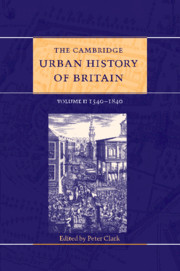Book contents
- Frontmatter
- 1 Introduction
- Part I Area surveys 1540–1840
- Part II Urban themes and types 1540–1700
- Part III Urban themes and types 1700–1840
- 14 Urban growth and economic change: from the late seventeenth century to 1841
- 15 Population and society 1700–1840
- 16 Politics and government 1700–1840
- 17 Culture and leisure 1700–1840
- 18 The transformation of urban space 1700–1840
- 19 London 1700–1840
- 20 Regional and county centres 1700–1840
- 21 Ports 1700–1840
- 22 Small towns 1700–1840
- 23 Health and leisure resorts 1700–1840
- 24 Industrialising towns 1700–1840
- 25 Conclusion
- Select Bibliography
- Index
- References
19 - London 1700–1840
from Part III - Urban themes and types 1700–1840
Published online by Cambridge University Press: 28 March 2008
- Frontmatter
- 1 Introduction
- Part I Area surveys 1540–1840
- Part II Urban themes and types 1540–1700
- Part III Urban themes and types 1700–1840
- 14 Urban growth and economic change: from the late seventeenth century to 1841
- 15 Population and society 1700–1840
- 16 Politics and government 1700–1840
- 17 Culture and leisure 1700–1840
- 18 The transformation of urban space 1700–1840
- 19 London 1700–1840
- 20 Regional and county centres 1700–1840
- 21 Ports 1700–1840
- 22 Small towns 1700–1840
- 23 Health and leisure resorts 1700–1840
- 24 Industrialising towns 1700–1840
- 25 Conclusion
- Select Bibliography
- Index
- References
Summary
LONDON: PORTENT OF THE FUTURE
‘In 1737 Samuel Johnson, having failed to make a very successful living hitherto, made his way to London, at the age of twenty-eight, and wrote a gloomy prognostication of his chances of survival:
For who would leave, unbribed, Hibernia’s land,
Or change the rocks of Scotland for the Strand?
There none are swept by sudden fate away,
But all whom hunger spares,with age decay:
Here malice, rapine, accident, conspire,
And now a rabble rages, now a fire;
Their ambush here relentless ruffians lay,
And here the fell attorney prowls for prey;
Here falling houses thunder on your head,
And here a female atheist talks you dead.
Johnson had not yet visited Scotland, or he might have revised his views on the comparative safety of life in the Highlands. It was in London that he found the company that he most longed to frequent and in London that he made his career. He did not leave London often and it was in London that he died forty-seven years after his arrival, having made his famous remark that a man who was tired of London was tired of life, as there was in London all that life could afford. Most of the poem had in fact little to do with London, although it was quite correct in pointing out that the capital had its highwaymen and that the older houses occasionally fell into the street. Johnson used London to typify decadence This was, from one point of view, part of an anti-urban tradition that long predated Johnson and long outlived him.
- Type
- Chapter
- Information
- The Cambridge Urban History of Britain , pp. 641 - 672Publisher: Cambridge University PressPrint publication year: 2000
References
- 7
- Cited by

